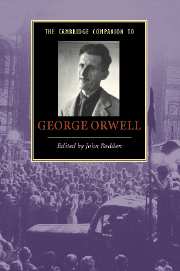Book contents
- Frontmatter
- 1 A political writer
- 2 Orwell and the biographers
- 3 Englands His Englands
- 4 The truths of experience: Orwell’s nonfiction of the 1930s
- 5 The fictional realist: novels of the 1930s
- 6 Orwell’s essays as a literary experience
- 7 ‘My country, right or left’: Orwell’s patriotism
- 8 Orwell and the British Left
- 9 Orwell, anti-Semitism and the Holocaust
- 10 Orwell, Socialism and the Cold War
- 11 Animal Farm: history as fable
- 12 Nineteen Eighty-Four: context and controversy
- 13 Orwell, the academy and the intellectuals
- 14 Orwell for today’s reader: an open letter
- 15 George Orwell: a bibliographic essay
- 16 Why Orwell still matters
- Further reading
- Index
10 - Orwell, Socialism and the Cold War
Published online by Cambridge University Press: 28 July 2007
- Frontmatter
- 1 A political writer
- 2 Orwell and the biographers
- 3 Englands His Englands
- 4 The truths of experience: Orwell’s nonfiction of the 1930s
- 5 The fictional realist: novels of the 1930s
- 6 Orwell’s essays as a literary experience
- 7 ‘My country, right or left’: Orwell’s patriotism
- 8 Orwell and the British Left
- 9 Orwell, anti-Semitism and the Holocaust
- 10 Orwell, Socialism and the Cold War
- 11 Animal Farm: history as fable
- 12 Nineteen Eighty-Four: context and controversy
- 13 Orwell, the academy and the intellectuals
- 14 Orwell for today’s reader: an open letter
- 15 George Orwell: a bibliographic essay
- 16 Why Orwell still matters
- Further reading
- Index
Summary
As an observer (and satirist) of realities, Orwell was - reliable. Yet that is too weak a word (though he changed his views on some points, and in any case never posed as an ex cathedra pundit). A man of the Left, our champion in the Cold War, he, better than most of his contemporaries, could take in the phenomena, the actualities.
But theory, or abstraction, was - as Clive James has pointed out - not his forte. What he saw of the injustices of colonial rule was, at a more secondhand level, attributed to imperialist exploitation and the source of comparative Western prosperity - refuted as James points out, by the existence of Sweden, but anyhow untenable on various grounds.
More central to Orwell's work was his view that the poverty and distress he saw in England was attributable to capitalism, and would be cured by the socialist state. So he was indeed a keen advocate of Socialism - though definable (as he put it) as justice and liberty.
But at the same time he had little use for some socialists. His reason was that the idea of justice and liberty had been 'buried beneath layer after layer of doctrinaire priggishness, party squabbles and half-baked “progressivism” until it is like a diamond hidden under a mountain of dung'.
Even worse, 'The underlying motive of many Socialists, I believe, is simply a hypertrophied sense of order. The present state of affairs offends them not because it causes misery, still less because it makes freedom impossible, but because it is untidy . . .
- Type
- Chapter
- Information
- The Cambridge Companion to George Orwell , pp. 126 - 132Publisher: Cambridge University PressPrint publication year: 2007
- 1
- Cited by

